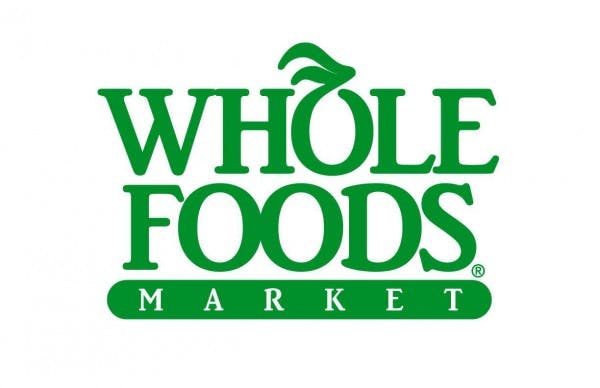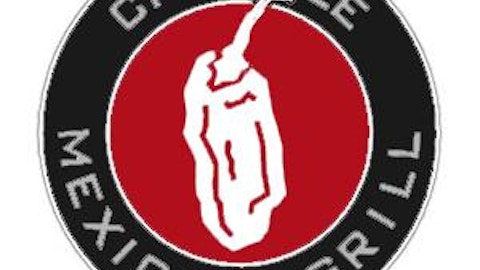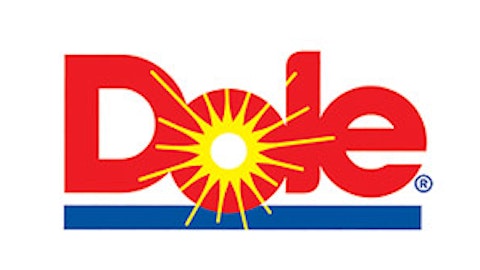The demand for organic food has exploded in the US over the last few years, and many companies have appeared to take advantage of the trend. Investors interested in organics should be familiar with a few companies in particular.
Whole Foods Market, Inc. (NASDAQ:WFM) is the primary publicly traded organic grocery store, while United Natural Foods, Inc. (NASDAQ:UNFI) is a large distributor. The Hain Celestial Group, Inc. (NASDAQ:HAIN) owns many popular organic food brands, and Annies Inc (NYSE:BNNY) sells many organic products of its own. Chipotle Mexican Grill, Inc. (NYSE:CMG) is the closest thing to organic fast food.

Whole Foods Market, Inc. (NASDAQ:WFM) runs the largest organic-focused supermarket
As organic food has grown increasingly popular, mainstream grocery stores like The Kroger Co. (NYSE:KR) have set up special sections solely for organic food. Still, Whole Foods Market, Inc. (NASDAQ:WFM) remains synonymous with organic for most consumers. To be fair, Whole Foods freely admits not everything it sells is organic, but for consumers looking to eat organic, Whole Foods remains the go-to store.
Since March 2009, Whole Foods Market, Inc. (NASDAQ:WFM) has returned over 600% to investors, but the stock has cooled in the last couple of months. In particular, shares are down over 11% since the company last reported earnings on Feb 13.
Despite the drop, Whole Foods Market, Inc. (NASDAQ:WFM) is still a relatively expensive stock — its price-to-earnings ratio of 32 is greater than both the broader S&P 500’s 18, and nearly three times Kroger’s 12.
Last week, analysts at Piper Jaffray downgraded the stock to Neutral from Overweight, citing decelerating growth and increasing competition. They believe in the growing market, but think shares are fairly valued.
United Natural Foods is an organic distributor
United Natural Foods isn’t a company that’s directly exposed to the consumer, but rather works in the background. The company operates 26 distribution centers and supplies organic and natural foods to supermarkets.
Admittedly, the company has an extensive supplier relationship with Whole Foods, but also supplies traditional grocery stores like Safeway Inc. (NYSE:SWY). Its relationship with mainstream grocery stores represents about 25% of its business.
Shares are down about 9% since the company last reported earnings Feb. 26. That disappointing release prompted analysts at Goldman Sachs to cut its price target on the stock from $58 to $51, in particular citing weakness from a labor dispute–the company has been fighting with the Teamsters union.
Labor dispute aside, for investors looking for a play on organic foods without getting tied directly to any one particular supermarket, United Natural Foods could be a winner.
Hain Celestial owns several organic food labels
Readers who happen to be regular viewers of Jim Cramer’s Mad Money are likely very familiar with Hain Celestial — the company’s CEO has appeared on the show a number of times.
At any rate, the company owns a number of natural and organic food brands, including Earth’s Best, Arrowhead Mills and Spectrum Naturals. Unlike Whole Foods and United Natural Foods, Hain Celestial is more of a focused play on the success of company’s brands in particular.
But if the demand for these types of products grows, it seems intuitive that Hain Celestial should see growing demand. Unlike Whole Foods and United Natural, shares of Hain Celestial are up better than 12% in the last three months.
In a note released on Jan. 22, Morgan Stanley named Hain Celestial a possible takeover target. However, the pick was based on a quantitative analysis using factors such as cash flow rather than any strategic takeover thesis.
Annie’s is known for its organic mac & cheese
With a market cap of less than $700 million, Annie’s is by far the smallest company on this list. It’s also possibly the most interesting, as it has drawn fire from anonymous short sellers. Nearly 20% of the company’s outstanding shares have been sold short.
Back in November, a blogger attacked Annie’s for its excessive valuation, noting that at the time shares were trading at 123 times the company’s 2012 free cash flow of $6 million. Despite that criticism, shares have remained firm, and are up over 11% since the company began trading roughly a year ago.
While Hain Celestial is a collection of organic and natural brands, Annie’s is a single brand in particular with a bunny logo on its packaging.
Recently the company saw some insider selling, as it priced 525,000 shares at $40 on Mar. 13.
Chipotle Mexican Grill, Inc. (NYSE:CMG) is the closest thing to an organic fast food play
When it comes to playing organic restaurants, Chipotle Mexican Grill, Inc. (NYSE:CMG) is the best option for investors. The company freely boasts of its commitment to quality natural and organic ingredients (what it calls “food with integrity”), though it admits that it sources organic produce “when practical” and uses naturally raised meat “whenever possible.”
Over the last year, Chipotle Mexican Grill, Inc. (NYSE:CMG) shares are down over 23%, but are actually up since famed short seller David Einhorn named the company a bearish bet back back on Oct. 2. Einhorn argued that Chipotle Mexican Grill, Inc. (NYSE:CMG) was exposed to growing competition from rival Taco Bell, and suggested that shares were overvalued.
Ironically, it is Chipotle’s organic image that insulates the company from competition from Taco Bell. As for valuation, Chipotle’s price-to-earnings ratio of roughly 37 is more than twice the broader S&P 500’s, but is much lower than rival Wendy’s nearly 318 P/E ratio.
Organic food: here to stay?
Despite their growing popularity, organic foods remain a somewhat controversial subject. A number of studies have cast doubt about claims that organic foods are healthier or better tasting.
Still, a growing base of consumers continue to demand higher quality foods. That could be good for shares of companies built around that market, including Whole Foods, United Natural Foods, Hain Celestial, Annie’s and Chipotle.
The article Investing in Organic Food originally appeared on Fool.com and is written by Salvatore “Sam” Mattera.
Copyright © 1995 – 2013 The Motley Fool, LLC. All rights reserved. The Motley Fool has a disclosure policy.
| Safeway Inc. (NYSE:SWY) |

